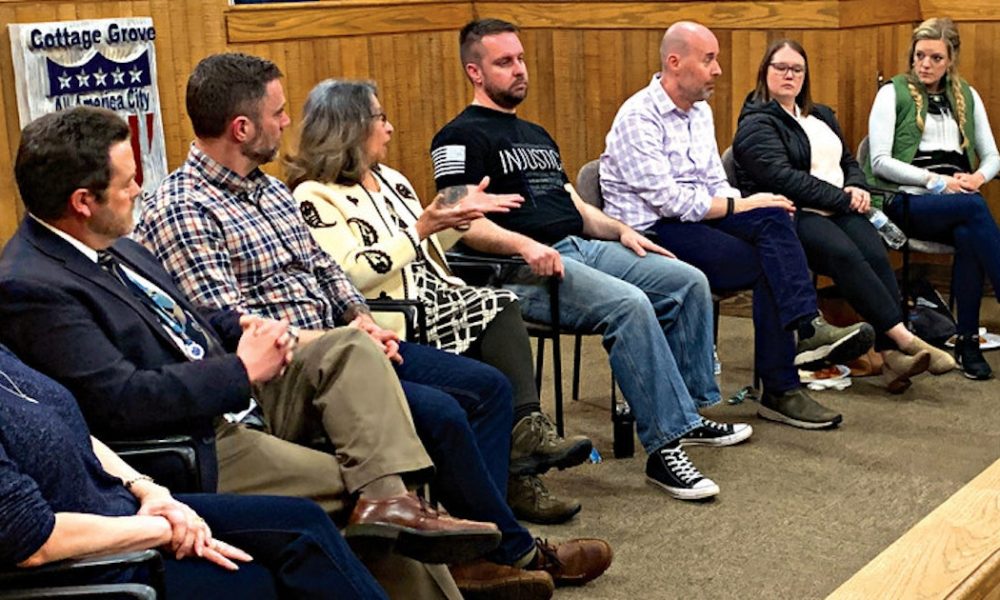 (Left to right) Kathy Kelty, peer court coordinator; Tim Herrmann, chief administrative officer at Cottage Grove Community Medical Center; Roger Brubaker, Lane County Public Health suicide prevention and mental health promotion coordinator; Anna Marie Dudley, South Lane School District and Cottage Grove Community Medical Center; Jason Cross, Cottage Grove Police Department detective; Damien Sands, executive director South Lane Mental Health; Amanda Hampton, program supervisor at Looking Glass Rural Program; Jade Chamness, McKinney-Vento Liaison South Lane School District; and Kevin Herrington, Cottage Grove High School principal. Aliya Hall/The Chronicle
(Left to right) Kathy Kelty, peer court coordinator; Tim Herrmann, chief administrative officer at Cottage Grove Community Medical Center; Roger Brubaker, Lane County Public Health suicide prevention and mental health promotion coordinator; Anna Marie Dudley, South Lane School District and Cottage Grove Community Medical Center; Jason Cross, Cottage Grove Police Department detective; Damien Sands, executive director South Lane Mental Health; Amanda Hampton, program supervisor at Looking Glass Rural Program; Jade Chamness, McKinney-Vento Liaison South Lane School District; and Kevin Herrington, Cottage Grove High School principal. Aliya Hall/The Chronicle
COTTAGE GROVE – With 1-in-5 teenagers suffering from a mental illness, according to teenmentalhealth.org, examining options for middle and high schoolers is more important than ever.
For that reason, the Cottage Grove Youth Advisory Council held a youth town hall centered around youth mental health with a panel of professionals in the mental health field.
Teens asked the panelists questions ranging from, ”What’s the best way to help a peer showing symptoms of depression or anxiety?” to ”What do I say?”
Panel members included Kathy Kelty, peer court coordinator; Tim Herrmann, chief administrative officer at Cottage Grove Community Medical Center; Roger Brubaker, Lane County Public Health suicide prevention and mental health promotion coordinator; Anna Marie Dudley, South Lane School District and Cottage Grove Community Medical Center; Jason Cross, Cottage Grove Police Department detective; Damien Sands, executive director South Lane Mental Health; Amanda Hampton, program supervisor at Looking Glass Rural Program; Jade Chamness, McKinney-Vento Liaison South Lane School District; and Kevin Herrington, Cottage Grove High School principal. Damien Sherwood, lead reporter at The Cottage Grove Sentinel, moderated the panel.
The biggest takeaway of the evening was that even though a teenager doesn’t have the degrees or background to mitigate mental health issues, listening to peers and letting them know that they aren’t alone and being empathetic can go a long way in helping peers who are at risk.
Even if the peer doesn’t want to engage or talk, Kelty said, ”let them know you’re there, even if they don’t want to talk now.”
Brubaker also added if a friend makes comments that suggests they are thinking about suicide, ask the question directly: ”Are you thinking about suicide?” Or ”Are you thinking of killing yourself?”
”It gives you the opportunity to listen to someone’s story,” he said, explaining the sensation that comes from holding onto a secret so much that it hurts and the relief that comes with finally talking about it. ”That’s what we provide when we ask that question. That relief is part of the healing and getting into a better place.”
When there is a more immediate need, Herrington and Chamness brought up tip lines that can be called or texted in the moment to help walk a teenager through what to say to a friend who needs advice. Cross also added that their department will make welfare checks if someone is in immediate need for help.
Another student asked what happens after going to an adult with a problem and Cross explained that there is always someone behind the police desk that can help. If not a danger to themselves or others, they can leave at any point; however, if they are they will talk with a councilor and develop a plan.
One of the biggest challenges teenagers face beyond knowing what to say, is the stigma that is attached to mental health and it’s impact on reputation. Cross said often the stigma comes form people not realizing that they’re not alone.
”Because people don’t know things about us personally, they think we can’t understand,” he said after explaining that his brother is bipolar and went off his medication, which led to him unintentionally killing someone. ”Part of removing stigma is saying ‘I can love someone who is going to spend the rest of his life in prison.’”
Sherwood also asked the students if they felt there were any barriers to mental health: students brought up having to be cautious how much they can talk to someone who is a mandatory reporter and the language barriers for non-English speakers.
Chamness said she encourages teenagers to ask if the adult is a mandatory reporter, but added that in her experience she will stop the adolescent before they share something they would have to report.
Dudley said that there is a deficit of bilingual and bicultural professionals, but the school district is working on addressing that in the following school year.
In closing remarks, Herrmann said to not underestimate the power of lisening and caring.
”It makes the difference,” he said. ”The whole idea of allowing for space sometimes means sitting with someone in silence. Be respectful and meet them where they’re at.”







